Analysis of Sustainable and Responsible Management in Tourism Sector
VerifiedAdded on 2023/06/10
|10
|3100
|346
Report
AI Summary
This report provides an explanation of the concepts, theories, and principles of sustainable and responsible tourism management. It critically analyzes the processes and practices applied in tourism and hospitality organizations, including an evaluation of sustainability in hotels and airports from the customer's viewpoint. The report highlights the importance of sustainable tourism in meeting the needs of tourists without harming the environment or communities, emphasizing principles such as sustainable resource use, waste reduction, biodiversity maintenance, support for local economies, community involvement, responsible marketing, research, and staff training. It also addresses the negative impacts of tourism on socio-culture and the environment, such as staged authenticity, standardization, commodification, habitat damage, and pollution. The report concludes by discussing the economic, social, and environmental benefits of sustainable tourism, including infrastructure improvement, cultural preservation, and community development, citing examples like rural and community tourism.
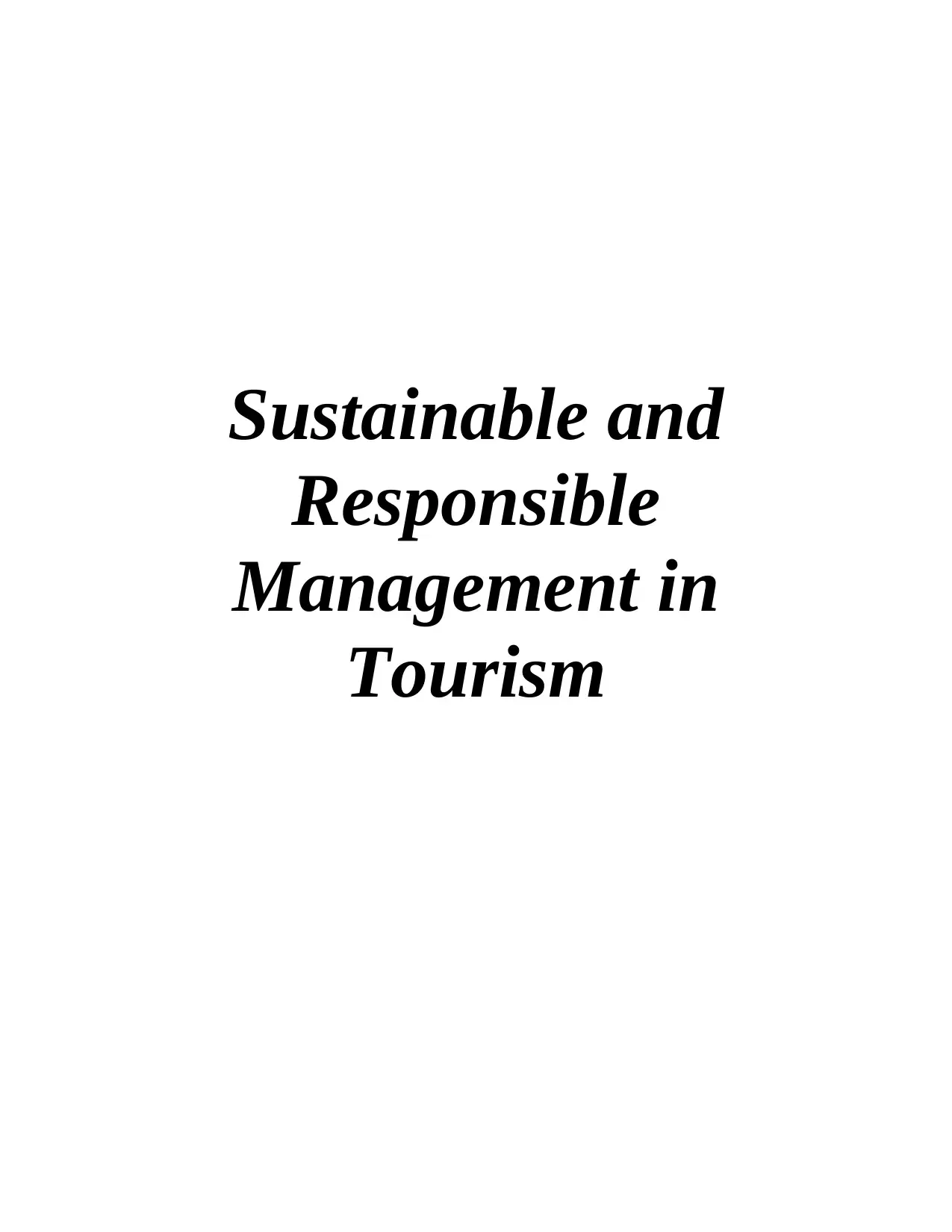
Sustainable and
Responsible
Management in
Tourism
Responsible
Management in
Tourism
Paraphrase This Document
Need a fresh take? Get an instant paraphrase of this document with our AI Paraphraser
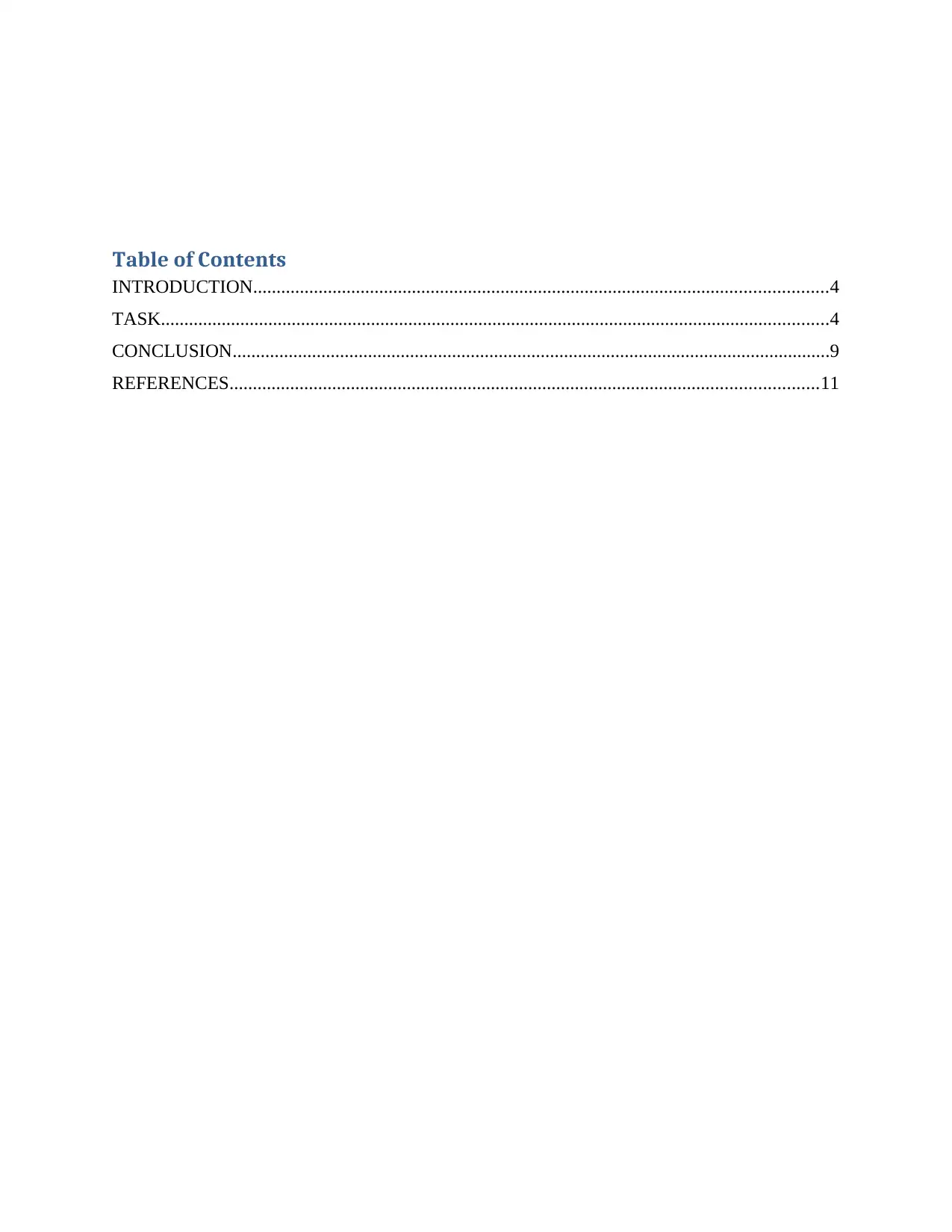
Table of Contents
INTRODUCTION...........................................................................................................................4
TASK...............................................................................................................................................4
CONCLUSION................................................................................................................................9
REFERENCES..............................................................................................................................11
INTRODUCTION...........................................................................................................................4
TASK...............................................................................................................................................4
CONCLUSION................................................................................................................................9
REFERENCES..............................................................................................................................11
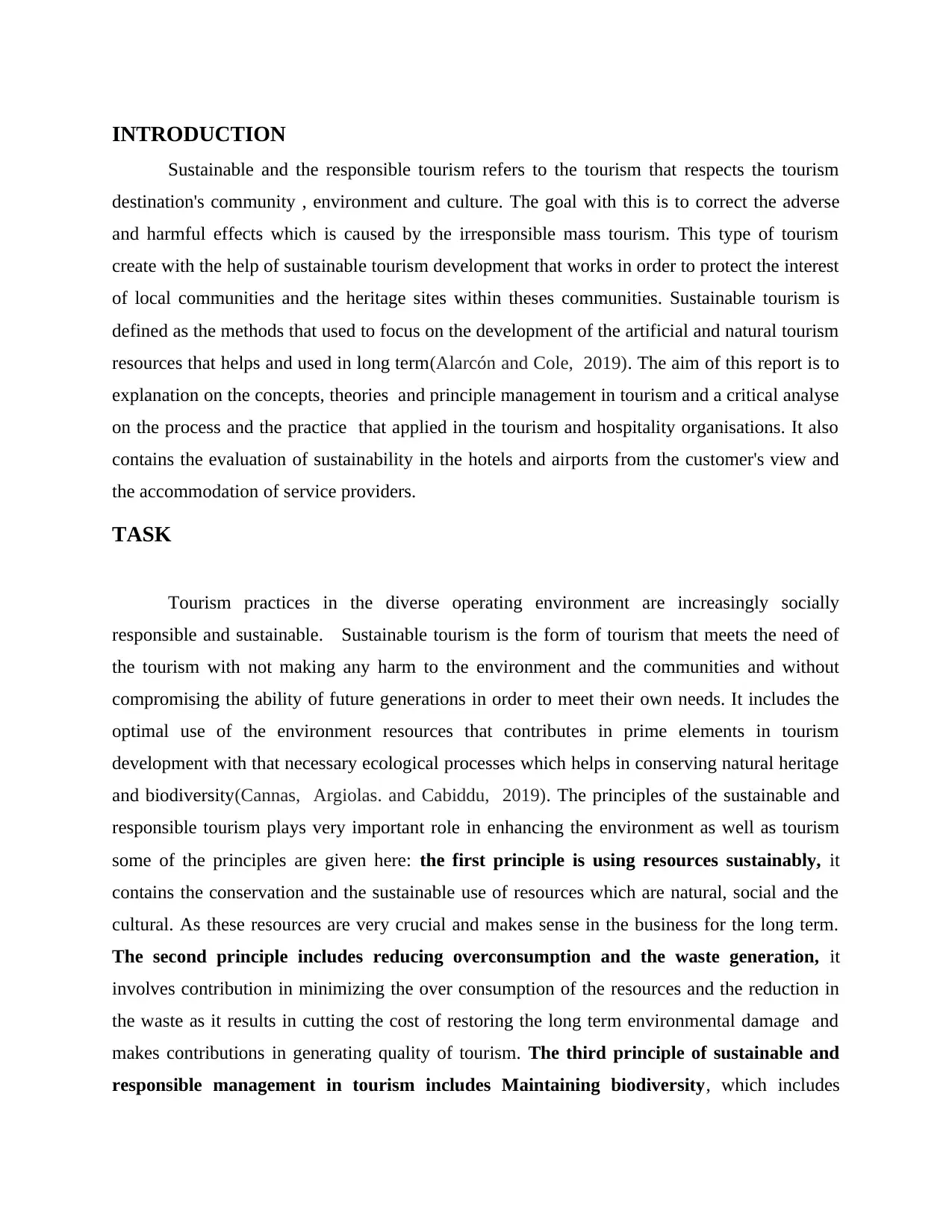
INTRODUCTION
Sustainable and the responsible tourism refers to the tourism that respects the tourism
destination's community , environment and culture. The goal with this is to correct the adverse
and harmful effects which is caused by the irresponsible mass tourism. This type of tourism
create with the help of sustainable tourism development that works in order to protect the interest
of local communities and the heritage sites within theses communities. Sustainable tourism is
defined as the methods that used to focus on the development of the artificial and natural tourism
resources that helps and used in long term(Alarcón and Cole, 2019). The aim of this report is to
explanation on the concepts, theories and principle management in tourism and a critical analyse
on the process and the practice that applied in the tourism and hospitality organisations. It also
contains the evaluation of sustainability in the hotels and airports from the customer's view and
the accommodation of service providers.
TASK
Tourism practices in the diverse operating environment are increasingly socially
responsible and sustainable. Sustainable tourism is the form of tourism that meets the need of
the tourism with not making any harm to the environment and the communities and without
compromising the ability of future generations in order to meet their own needs. It includes the
optimal use of the environment resources that contributes in prime elements in tourism
development with that necessary ecological processes which helps in conserving natural heritage
and biodiversity(Cannas, Argiolas. and Cabiddu, 2019). The principles of the sustainable and
responsible tourism plays very important role in enhancing the environment as well as tourism
some of the principles are given here: the first principle is using resources sustainably, it
contains the conservation and the sustainable use of resources which are natural, social and the
cultural. As these resources are very crucial and makes sense in the business for the long term.
The second principle includes reducing overconsumption and the waste generation, it
involves contribution in minimizing the over consumption of the resources and the reduction in
the waste as it results in cutting the cost of restoring the long term environmental damage and
makes contributions in generating quality of tourism. The third principle of sustainable and
responsible management in tourism includes Maintaining biodiversity, which includes
Sustainable and the responsible tourism refers to the tourism that respects the tourism
destination's community , environment and culture. The goal with this is to correct the adverse
and harmful effects which is caused by the irresponsible mass tourism. This type of tourism
create with the help of sustainable tourism development that works in order to protect the interest
of local communities and the heritage sites within theses communities. Sustainable tourism is
defined as the methods that used to focus on the development of the artificial and natural tourism
resources that helps and used in long term(Alarcón and Cole, 2019). The aim of this report is to
explanation on the concepts, theories and principle management in tourism and a critical analyse
on the process and the practice that applied in the tourism and hospitality organisations. It also
contains the evaluation of sustainability in the hotels and airports from the customer's view and
the accommodation of service providers.
TASK
Tourism practices in the diverse operating environment are increasingly socially
responsible and sustainable. Sustainable tourism is the form of tourism that meets the need of
the tourism with not making any harm to the environment and the communities and without
compromising the ability of future generations in order to meet their own needs. It includes the
optimal use of the environment resources that contributes in prime elements in tourism
development with that necessary ecological processes which helps in conserving natural heritage
and biodiversity(Cannas, Argiolas. and Cabiddu, 2019). The principles of the sustainable and
responsible tourism plays very important role in enhancing the environment as well as tourism
some of the principles are given here: the first principle is using resources sustainably, it
contains the conservation and the sustainable use of resources which are natural, social and the
cultural. As these resources are very crucial and makes sense in the business for the long term.
The second principle includes reducing overconsumption and the waste generation, it
involves contribution in minimizing the over consumption of the resources and the reduction in
the waste as it results in cutting the cost of restoring the long term environmental damage and
makes contributions in generating quality of tourism. The third principle of sustainable and
responsible management in tourism includes Maintaining biodiversity, which includes
⊘ This is a preview!⊘
Do you want full access?
Subscribe today to unlock all pages.

Trusted by 1+ million students worldwide
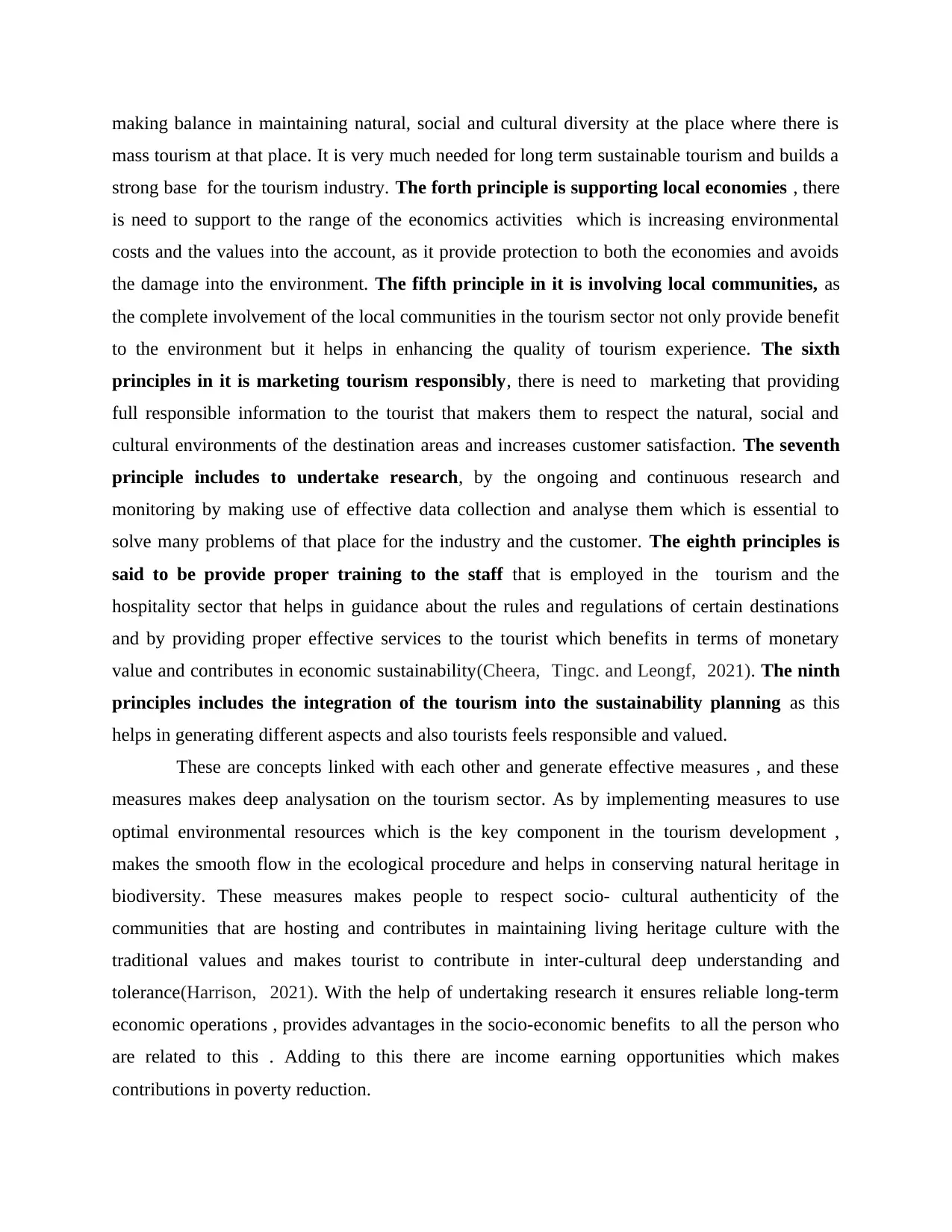
making balance in maintaining natural, social and cultural diversity at the place where there is
mass tourism at that place. It is very much needed for long term sustainable tourism and builds a
strong base for the tourism industry. The forth principle is supporting local economies , there
is need to support to the range of the economics activities which is increasing environmental
costs and the values into the account, as it provide protection to both the economies and avoids
the damage into the environment. The fifth principle in it is involving local communities, as
the complete involvement of the local communities in the tourism sector not only provide benefit
to the environment but it helps in enhancing the quality of tourism experience. The sixth
principles in it is marketing tourism responsibly, there is need to marketing that providing
full responsible information to the tourist that makers them to respect the natural, social and
cultural environments of the destination areas and increases customer satisfaction. The seventh
principle includes to undertake research, by the ongoing and continuous research and
monitoring by making use of effective data collection and analyse them which is essential to
solve many problems of that place for the industry and the customer. The eighth principles is
said to be provide proper training to the staff that is employed in the tourism and the
hospitality sector that helps in guidance about the rules and regulations of certain destinations
and by providing proper effective services to the tourist which benefits in terms of monetary
value and contributes in economic sustainability(Cheera, Tingc. and Leongf, 2021). The ninth
principles includes the integration of the tourism into the sustainability planning as this
helps in generating different aspects and also tourists feels responsible and valued.
These are concepts linked with each other and generate effective measures , and these
measures makes deep analysation on the tourism sector. As by implementing measures to use
optimal environmental resources which is the key component in the tourism development ,
makes the smooth flow in the ecological procedure and helps in conserving natural heritage in
biodiversity. These measures makes people to respect socio- cultural authenticity of the
communities that are hosting and contributes in maintaining living heritage culture with the
traditional values and makes tourist to contribute in inter-cultural deep understanding and
tolerance(Harrison, 2021). With the help of undertaking research it ensures reliable long-term
economic operations , provides advantages in the socio-economic benefits to all the person who
are related to this . Adding to this there are income earning opportunities which makes
contributions in poverty reduction.
mass tourism at that place. It is very much needed for long term sustainable tourism and builds a
strong base for the tourism industry. The forth principle is supporting local economies , there
is need to support to the range of the economics activities which is increasing environmental
costs and the values into the account, as it provide protection to both the economies and avoids
the damage into the environment. The fifth principle in it is involving local communities, as
the complete involvement of the local communities in the tourism sector not only provide benefit
to the environment but it helps in enhancing the quality of tourism experience. The sixth
principles in it is marketing tourism responsibly, there is need to marketing that providing
full responsible information to the tourist that makers them to respect the natural, social and
cultural environments of the destination areas and increases customer satisfaction. The seventh
principle includes to undertake research, by the ongoing and continuous research and
monitoring by making use of effective data collection and analyse them which is essential to
solve many problems of that place for the industry and the customer. The eighth principles is
said to be provide proper training to the staff that is employed in the tourism and the
hospitality sector that helps in guidance about the rules and regulations of certain destinations
and by providing proper effective services to the tourist which benefits in terms of monetary
value and contributes in economic sustainability(Cheera, Tingc. and Leongf, 2021). The ninth
principles includes the integration of the tourism into the sustainability planning as this
helps in generating different aspects and also tourists feels responsible and valued.
These are concepts linked with each other and generate effective measures , and these
measures makes deep analysation on the tourism sector. As by implementing measures to use
optimal environmental resources which is the key component in the tourism development ,
makes the smooth flow in the ecological procedure and helps in conserving natural heritage in
biodiversity. These measures makes people to respect socio- cultural authenticity of the
communities that are hosting and contributes in maintaining living heritage culture with the
traditional values and makes tourist to contribute in inter-cultural deep understanding and
tolerance(Harrison, 2021). With the help of undertaking research it ensures reliable long-term
economic operations , provides advantages in the socio-economic benefits to all the person who
are related to this . Adding to this there are income earning opportunities which makes
contributions in poverty reduction.
Paraphrase This Document
Need a fresh take? Get an instant paraphrase of this document with our AI Paraphraser
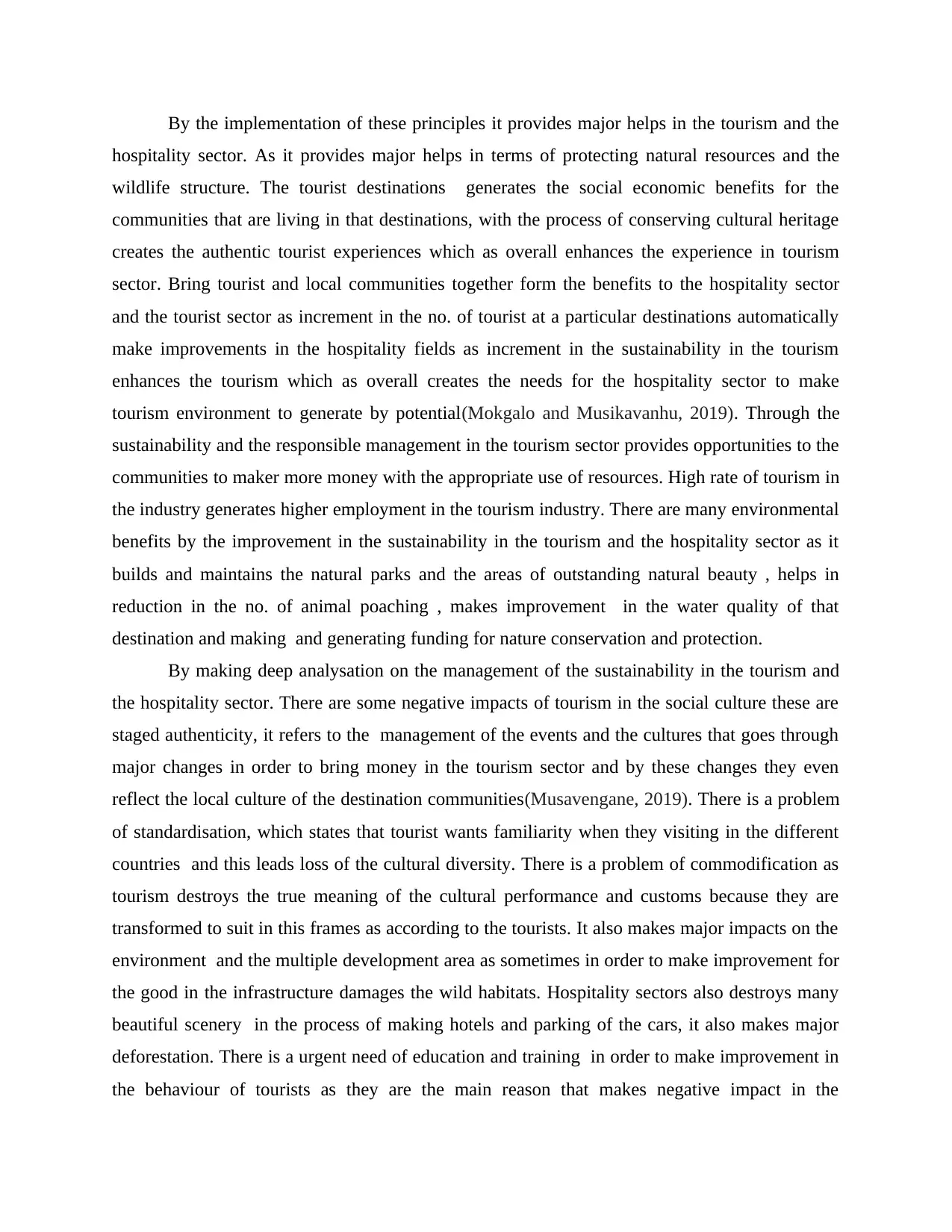
By the implementation of these principles it provides major helps in the tourism and the
hospitality sector. As it provides major helps in terms of protecting natural resources and the
wildlife structure. The tourist destinations generates the social economic benefits for the
communities that are living in that destinations, with the process of conserving cultural heritage
creates the authentic tourist experiences which as overall enhances the experience in tourism
sector. Bring tourist and local communities together form the benefits to the hospitality sector
and the tourist sector as increment in the no. of tourist at a particular destinations automatically
make improvements in the hospitality fields as increment in the sustainability in the tourism
enhances the tourism which as overall creates the needs for the hospitality sector to make
tourism environment to generate by potential(Mokgalo and Musikavanhu, 2019). Through the
sustainability and the responsible management in the tourism sector provides opportunities to the
communities to maker more money with the appropriate use of resources. High rate of tourism in
the industry generates higher employment in the tourism industry. There are many environmental
benefits by the improvement in the sustainability in the tourism and the hospitality sector as it
builds and maintains the natural parks and the areas of outstanding natural beauty , helps in
reduction in the no. of animal poaching , makes improvement in the water quality of that
destination and making and generating funding for nature conservation and protection.
By making deep analysation on the management of the sustainability in the tourism and
the hospitality sector. There are some negative impacts of tourism in the social culture these are
staged authenticity, it refers to the management of the events and the cultures that goes through
major changes in order to bring money in the tourism sector and by these changes they even
reflect the local culture of the destination communities(Musavengane, 2019). There is a problem
of standardisation, which states that tourist wants familiarity when they visiting in the different
countries and this leads loss of the cultural diversity. There is a problem of commodification as
tourism destroys the true meaning of the cultural performance and customs because they are
transformed to suit in this frames as according to the tourists. It also makes major impacts on the
environment and the multiple development area as sometimes in order to make improvement for
the good in the infrastructure damages the wild habitats. Hospitality sectors also destroys many
beautiful scenery in the process of making hotels and parking of the cars, it also makes major
deforestation. There is a urgent need of education and training in order to make improvement in
the behaviour of tourists as they are the main reason that makes negative impact in the
hospitality sector. As it provides major helps in terms of protecting natural resources and the
wildlife structure. The tourist destinations generates the social economic benefits for the
communities that are living in that destinations, with the process of conserving cultural heritage
creates the authentic tourist experiences which as overall enhances the experience in tourism
sector. Bring tourist and local communities together form the benefits to the hospitality sector
and the tourist sector as increment in the no. of tourist at a particular destinations automatically
make improvements in the hospitality fields as increment in the sustainability in the tourism
enhances the tourism which as overall creates the needs for the hospitality sector to make
tourism environment to generate by potential(Mokgalo and Musikavanhu, 2019). Through the
sustainability and the responsible management in the tourism sector provides opportunities to the
communities to maker more money with the appropriate use of resources. High rate of tourism in
the industry generates higher employment in the tourism industry. There are many environmental
benefits by the improvement in the sustainability in the tourism and the hospitality sector as it
builds and maintains the natural parks and the areas of outstanding natural beauty , helps in
reduction in the no. of animal poaching , makes improvement in the water quality of that
destination and making and generating funding for nature conservation and protection.
By making deep analysation on the management of the sustainability in the tourism and
the hospitality sector. There are some negative impacts of tourism in the social culture these are
staged authenticity, it refers to the management of the events and the cultures that goes through
major changes in order to bring money in the tourism sector and by these changes they even
reflect the local culture of the destination communities(Musavengane, 2019). There is a problem
of standardisation, which states that tourist wants familiarity when they visiting in the different
countries and this leads loss of the cultural diversity. There is a problem of commodification as
tourism destroys the true meaning of the cultural performance and customs because they are
transformed to suit in this frames as according to the tourists. It also makes major impacts on the
environment and the multiple development area as sometimes in order to make improvement for
the good in the infrastructure damages the wild habitats. Hospitality sectors also destroys many
beautiful scenery in the process of making hotels and parking of the cars, it also makes major
deforestation. There is a urgent need of education and training in order to make improvement in
the behaviour of tourists as they are the main reason that makes negative impact in the
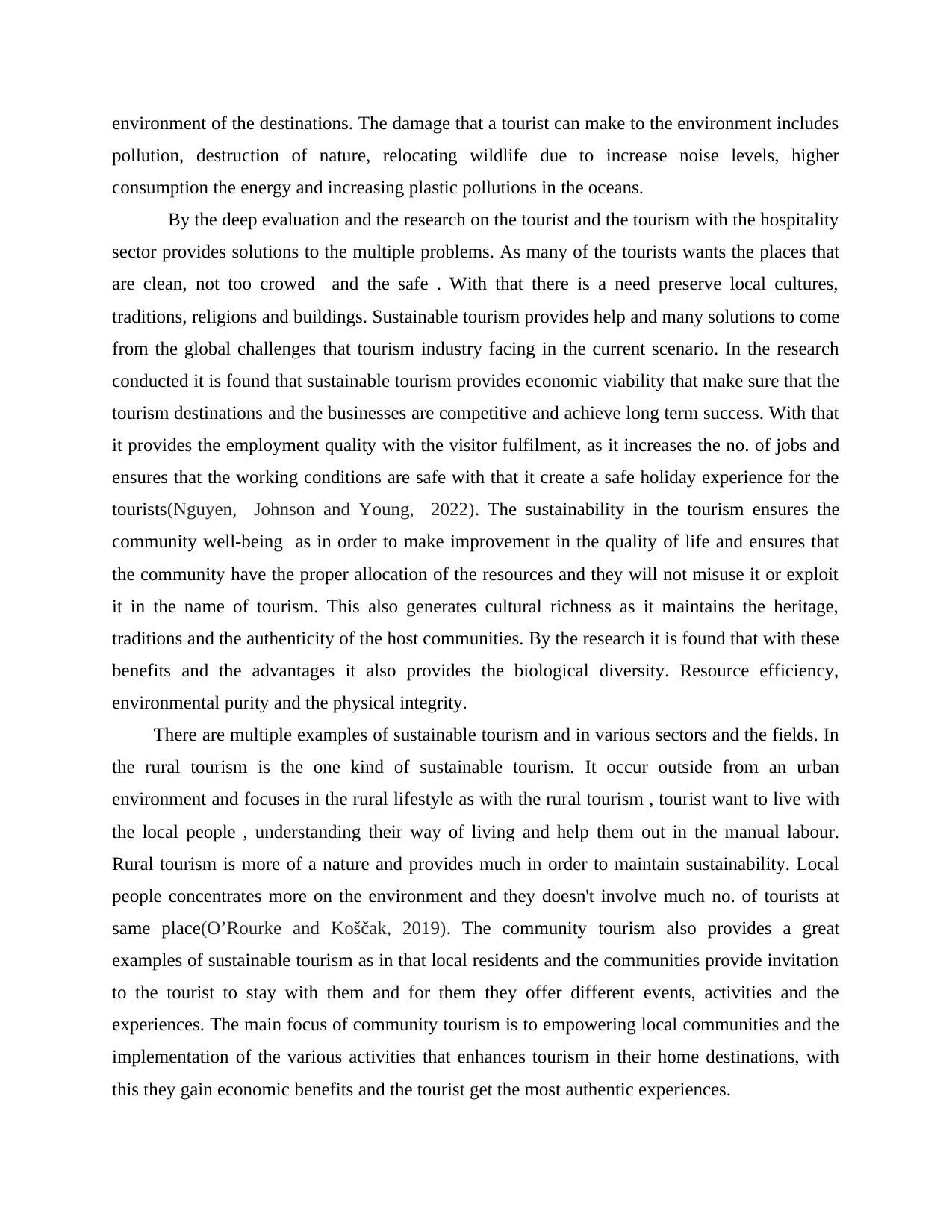
environment of the destinations. The damage that a tourist can make to the environment includes
pollution, destruction of nature, relocating wildlife due to increase noise levels, higher
consumption the energy and increasing plastic pollutions in the oceans.
By the deep evaluation and the research on the tourist and the tourism with the hospitality
sector provides solutions to the multiple problems. As many of the tourists wants the places that
are clean, not too crowed and the safe . With that there is a need preserve local cultures,
traditions, religions and buildings. Sustainable tourism provides help and many solutions to come
from the global challenges that tourism industry facing in the current scenario. In the research
conducted it is found that sustainable tourism provides economic viability that make sure that the
tourism destinations and the businesses are competitive and achieve long term success. With that
it provides the employment quality with the visitor fulfilment, as it increases the no. of jobs and
ensures that the working conditions are safe with that it create a safe holiday experience for the
tourists(Nguyen, Johnson and Young, 2022). The sustainability in the tourism ensures the
community well-being as in order to make improvement in the quality of life and ensures that
the community have the proper allocation of the resources and they will not misuse it or exploit
it in the name of tourism. This also generates cultural richness as it maintains the heritage,
traditions and the authenticity of the host communities. By the research it is found that with these
benefits and the advantages it also provides the biological diversity. Resource efficiency,
environmental purity and the physical integrity.
There are multiple examples of sustainable tourism and in various sectors and the fields. In
the rural tourism is the one kind of sustainable tourism. It occur outside from an urban
environment and focuses in the rural lifestyle as with the rural tourism , tourist want to live with
the local people , understanding their way of living and help them out in the manual labour.
Rural tourism is more of a nature and provides much in order to maintain sustainability. Local
people concentrates more on the environment and they doesn't involve much no. of tourists at
same place(O’Rourke and Koščak, 2019). The community tourism also provides a great
examples of sustainable tourism as in that local residents and the communities provide invitation
to the tourist to stay with them and for them they offer different events, activities and the
experiences. The main focus of community tourism is to empowering local communities and the
implementation of the various activities that enhances tourism in their home destinations, with
this they gain economic benefits and the tourist get the most authentic experiences.
pollution, destruction of nature, relocating wildlife due to increase noise levels, higher
consumption the energy and increasing plastic pollutions in the oceans.
By the deep evaluation and the research on the tourist and the tourism with the hospitality
sector provides solutions to the multiple problems. As many of the tourists wants the places that
are clean, not too crowed and the safe . With that there is a need preserve local cultures,
traditions, religions and buildings. Sustainable tourism provides help and many solutions to come
from the global challenges that tourism industry facing in the current scenario. In the research
conducted it is found that sustainable tourism provides economic viability that make sure that the
tourism destinations and the businesses are competitive and achieve long term success. With that
it provides the employment quality with the visitor fulfilment, as it increases the no. of jobs and
ensures that the working conditions are safe with that it create a safe holiday experience for the
tourists(Nguyen, Johnson and Young, 2022). The sustainability in the tourism ensures the
community well-being as in order to make improvement in the quality of life and ensures that
the community have the proper allocation of the resources and they will not misuse it or exploit
it in the name of tourism. This also generates cultural richness as it maintains the heritage,
traditions and the authenticity of the host communities. By the research it is found that with these
benefits and the advantages it also provides the biological diversity. Resource efficiency,
environmental purity and the physical integrity.
There are multiple examples of sustainable tourism and in various sectors and the fields. In
the rural tourism is the one kind of sustainable tourism. It occur outside from an urban
environment and focuses in the rural lifestyle as with the rural tourism , tourist want to live with
the local people , understanding their way of living and help them out in the manual labour.
Rural tourism is more of a nature and provides much in order to maintain sustainability. Local
people concentrates more on the environment and they doesn't involve much no. of tourists at
same place(O’Rourke and Koščak, 2019). The community tourism also provides a great
examples of sustainable tourism as in that local residents and the communities provide invitation
to the tourist to stay with them and for them they offer different events, activities and the
experiences. The main focus of community tourism is to empowering local communities and the
implementation of the various activities that enhances tourism in their home destinations, with
this they gain economic benefits and the tourist get the most authentic experiences.
⊘ This is a preview!⊘
Do you want full access?
Subscribe today to unlock all pages.

Trusted by 1+ million students worldwide
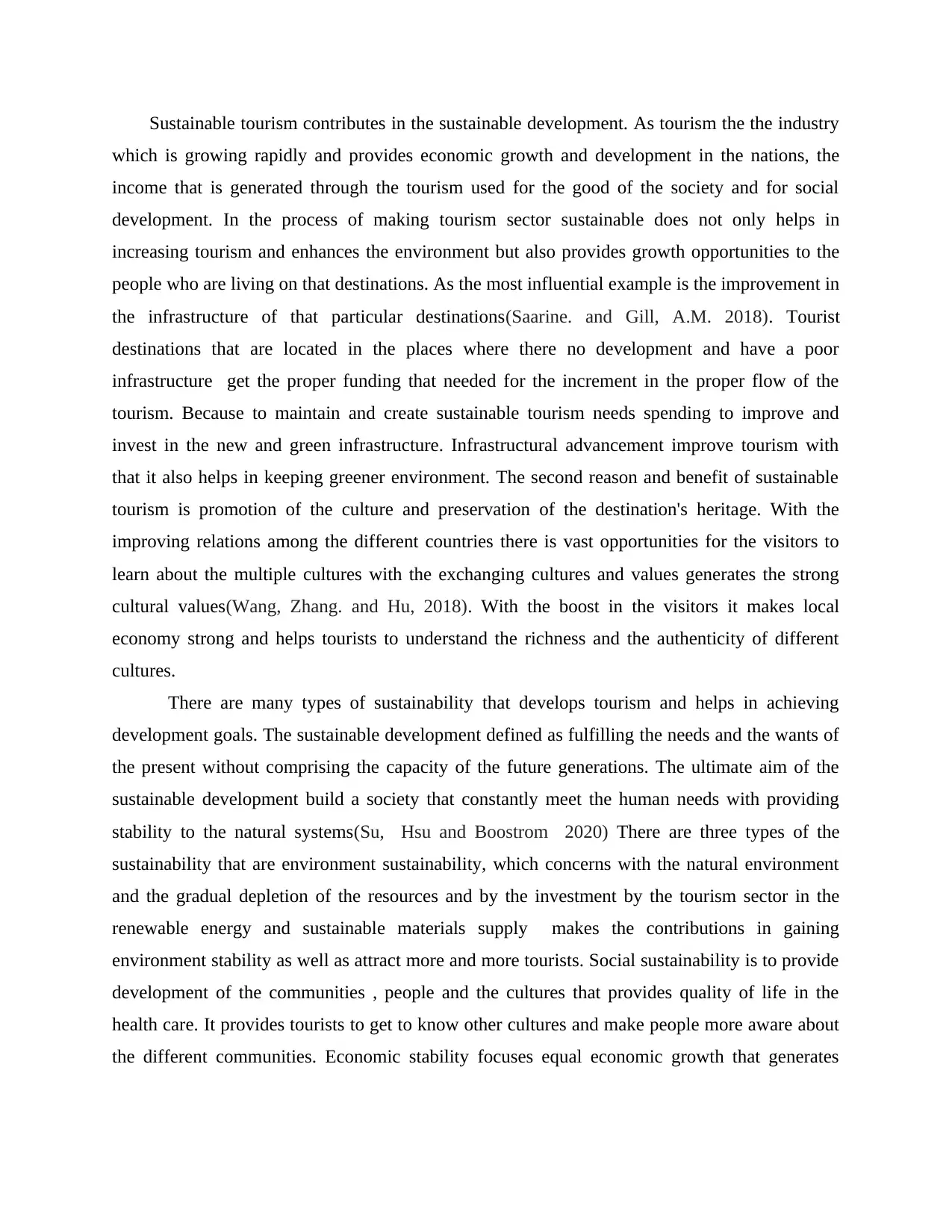
Sustainable tourism contributes in the sustainable development. As tourism the the industry
which is growing rapidly and provides economic growth and development in the nations, the
income that is generated through the tourism used for the good of the society and for social
development. In the process of making tourism sector sustainable does not only helps in
increasing tourism and enhances the environment but also provides growth opportunities to the
people who are living on that destinations. As the most influential example is the improvement in
the infrastructure of that particular destinations(Saarine. and Gill, A.M. 2018). Tourist
destinations that are located in the places where there no development and have a poor
infrastructure get the proper funding that needed for the increment in the proper flow of the
tourism. Because to maintain and create sustainable tourism needs spending to improve and
invest in the new and green infrastructure. Infrastructural advancement improve tourism with
that it also helps in keeping greener environment. The second reason and benefit of sustainable
tourism is promotion of the culture and preservation of the destination's heritage. With the
improving relations among the different countries there is vast opportunities for the visitors to
learn about the multiple cultures with the exchanging cultures and values generates the strong
cultural values(Wang, Zhang. and Hu, 2018). With the boost in the visitors it makes local
economy strong and helps tourists to understand the richness and the authenticity of different
cultures.
There are many types of sustainability that develops tourism and helps in achieving
development goals. The sustainable development defined as fulfilling the needs and the wants of
the present without comprising the capacity of the future generations. The ultimate aim of the
sustainable development build a society that constantly meet the human needs with providing
stability to the natural systems(Su, Hsu and Boostrom 2020) There are three types of the
sustainability that are environment sustainability, which concerns with the natural environment
and the gradual depletion of the resources and by the investment by the tourism sector in the
renewable energy and sustainable materials supply makes the contributions in gaining
environment stability as well as attract more and more tourists. Social sustainability is to provide
development of the communities , people and the cultures that provides quality of life in the
health care. It provides tourists to get to know other cultures and make people more aware about
the different communities. Economic stability focuses equal economic growth that generates
which is growing rapidly and provides economic growth and development in the nations, the
income that is generated through the tourism used for the good of the society and for social
development. In the process of making tourism sector sustainable does not only helps in
increasing tourism and enhances the environment but also provides growth opportunities to the
people who are living on that destinations. As the most influential example is the improvement in
the infrastructure of that particular destinations(Saarine. and Gill, A.M. 2018). Tourist
destinations that are located in the places where there no development and have a poor
infrastructure get the proper funding that needed for the increment in the proper flow of the
tourism. Because to maintain and create sustainable tourism needs spending to improve and
invest in the new and green infrastructure. Infrastructural advancement improve tourism with
that it also helps in keeping greener environment. The second reason and benefit of sustainable
tourism is promotion of the culture and preservation of the destination's heritage. With the
improving relations among the different countries there is vast opportunities for the visitors to
learn about the multiple cultures with the exchanging cultures and values generates the strong
cultural values(Wang, Zhang. and Hu, 2018). With the boost in the visitors it makes local
economy strong and helps tourists to understand the richness and the authenticity of different
cultures.
There are many types of sustainability that develops tourism and helps in achieving
development goals. The sustainable development defined as fulfilling the needs and the wants of
the present without comprising the capacity of the future generations. The ultimate aim of the
sustainable development build a society that constantly meet the human needs with providing
stability to the natural systems(Su, Hsu and Boostrom 2020) There are three types of the
sustainability that are environment sustainability, which concerns with the natural environment
and the gradual depletion of the resources and by the investment by the tourism sector in the
renewable energy and sustainable materials supply makes the contributions in gaining
environment stability as well as attract more and more tourists. Social sustainability is to provide
development of the communities , people and the cultures that provides quality of life in the
health care. It provides tourists to get to know other cultures and make people more aware about
the different communities. Economic stability focuses equal economic growth that generates
Paraphrase This Document
Need a fresh take? Get an instant paraphrase of this document with our AI Paraphraser
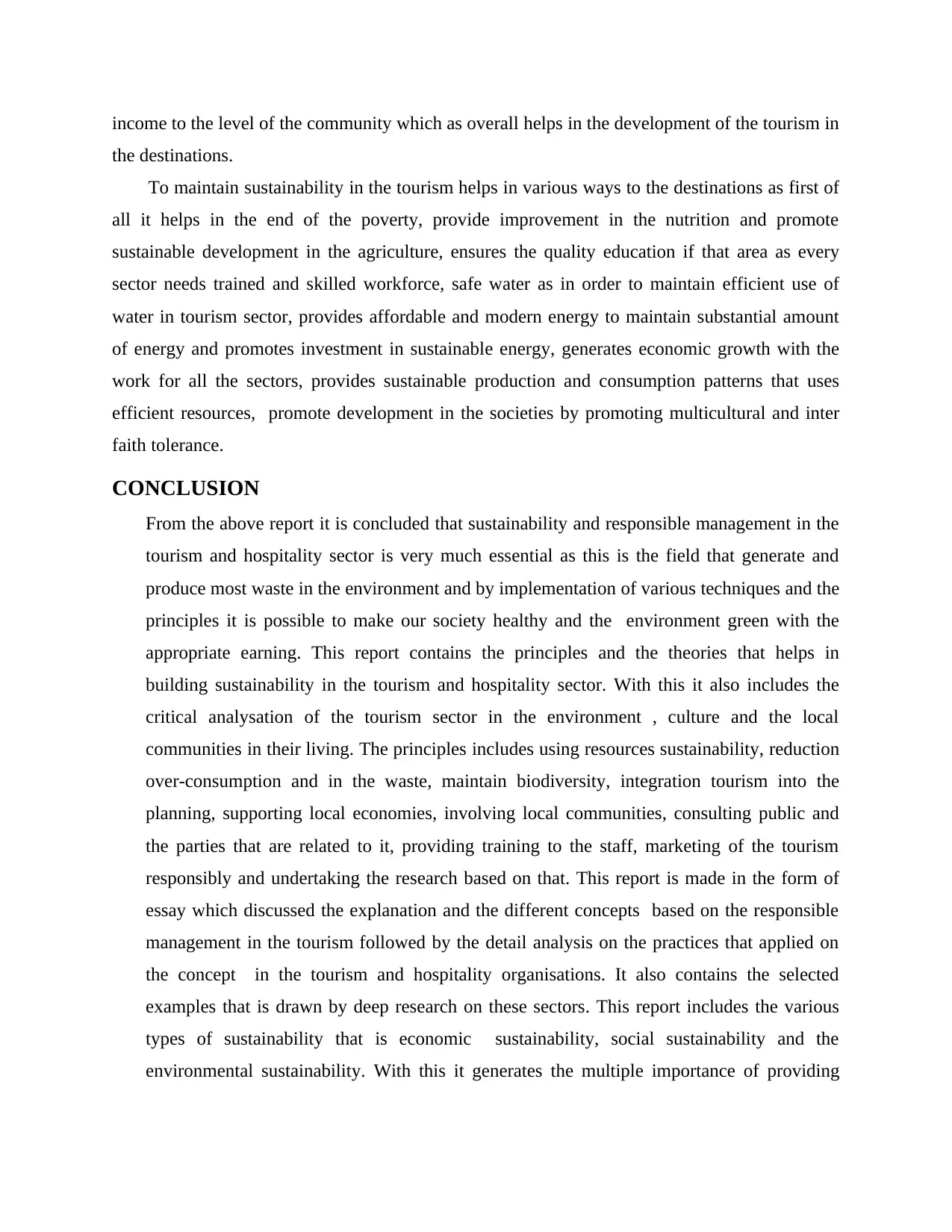
income to the level of the community which as overall helps in the development of the tourism in
the destinations.
To maintain sustainability in the tourism helps in various ways to the destinations as first of
all it helps in the end of the poverty, provide improvement in the nutrition and promote
sustainable development in the agriculture, ensures the quality education if that area as every
sector needs trained and skilled workforce, safe water as in order to maintain efficient use of
water in tourism sector, provides affordable and modern energy to maintain substantial amount
of energy and promotes investment in sustainable energy, generates economic growth with the
work for all the sectors, provides sustainable production and consumption patterns that uses
efficient resources, promote development in the societies by promoting multicultural and inter
faith tolerance.
CONCLUSION
From the above report it is concluded that sustainability and responsible management in the
tourism and hospitality sector is very much essential as this is the field that generate and
produce most waste in the environment and by implementation of various techniques and the
principles it is possible to make our society healthy and the environment green with the
appropriate earning. This report contains the principles and the theories that helps in
building sustainability in the tourism and hospitality sector. With this it also includes the
critical analysation of the tourism sector in the environment , culture and the local
communities in their living. The principles includes using resources sustainability, reduction
over-consumption and in the waste, maintain biodiversity, integration tourism into the
planning, supporting local economies, involving local communities, consulting public and
the parties that are related to it, providing training to the staff, marketing of the tourism
responsibly and undertaking the research based on that. This report is made in the form of
essay which discussed the explanation and the different concepts based on the responsible
management in the tourism followed by the detail analysis on the practices that applied on
the concept in the tourism and hospitality organisations. It also contains the selected
examples that is drawn by deep research on these sectors. This report includes the various
types of sustainability that is economic sustainability, social sustainability and the
environmental sustainability. With this it generates the multiple importance of providing
the destinations.
To maintain sustainability in the tourism helps in various ways to the destinations as first of
all it helps in the end of the poverty, provide improvement in the nutrition and promote
sustainable development in the agriculture, ensures the quality education if that area as every
sector needs trained and skilled workforce, safe water as in order to maintain efficient use of
water in tourism sector, provides affordable and modern energy to maintain substantial amount
of energy and promotes investment in sustainable energy, generates economic growth with the
work for all the sectors, provides sustainable production and consumption patterns that uses
efficient resources, promote development in the societies by promoting multicultural and inter
faith tolerance.
CONCLUSION
From the above report it is concluded that sustainability and responsible management in the
tourism and hospitality sector is very much essential as this is the field that generate and
produce most waste in the environment and by implementation of various techniques and the
principles it is possible to make our society healthy and the environment green with the
appropriate earning. This report contains the principles and the theories that helps in
building sustainability in the tourism and hospitality sector. With this it also includes the
critical analysation of the tourism sector in the environment , culture and the local
communities in their living. The principles includes using resources sustainability, reduction
over-consumption and in the waste, maintain biodiversity, integration tourism into the
planning, supporting local economies, involving local communities, consulting public and
the parties that are related to it, providing training to the staff, marketing of the tourism
responsibly and undertaking the research based on that. This report is made in the form of
essay which discussed the explanation and the different concepts based on the responsible
management in the tourism followed by the detail analysis on the practices that applied on
the concept in the tourism and hospitality organisations. It also contains the selected
examples that is drawn by deep research on these sectors. This report includes the various
types of sustainability that is economic sustainability, social sustainability and the
environmental sustainability. With this it generates the multiple importance of providing

sustainability in the tourism sector which also benefits the different sector as well as the
people of that particular destinations.
people of that particular destinations.
⊘ This is a preview!⊘
Do you want full access?
Subscribe today to unlock all pages.

Trusted by 1+ million students worldwide
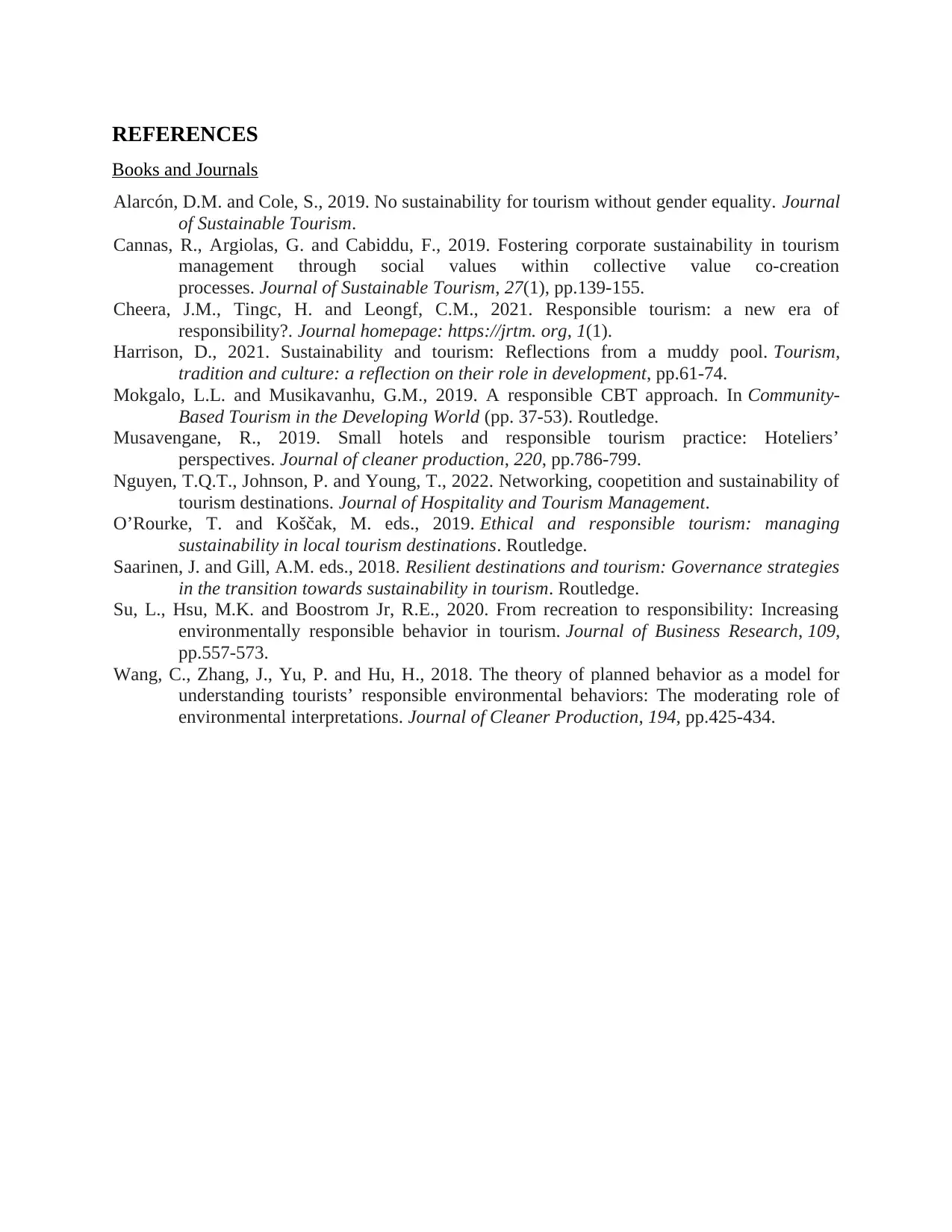
REFERENCES
Books and Journals
Alarcón, D.M. and Cole, S., 2019. No sustainability for tourism without gender equality. Journal
of Sustainable Tourism.
Cannas, R., Argiolas, G. and Cabiddu, F., 2019. Fostering corporate sustainability in tourism
management through social values within collective value co-creation
processes. Journal of Sustainable Tourism, 27(1), pp.139-155.
Cheera, J.M., Tingc, H. and Leongf, C.M., 2021. Responsible tourism: a new era of
responsibility?. Journal homepage: https://jrtm. org, 1(1).
Harrison, D., 2021. Sustainability and tourism: Reflections from a muddy pool. Tourism,
tradition and culture: a reflection on their role in development, pp.61-74.
Mokgalo, L.L. and Musikavanhu, G.M., 2019. A responsible CBT approach. In Community-
Based Tourism in the Developing World (pp. 37-53). Routledge.
Musavengane, R., 2019. Small hotels and responsible tourism practice: Hoteliers’
perspectives. Journal of cleaner production, 220, pp.786-799.
Nguyen, T.Q.T., Johnson, P. and Young, T., 2022. Networking, coopetition and sustainability of
tourism destinations. Journal of Hospitality and Tourism Management.
O’Rourke, T. and Koščak, M. eds., 2019. Ethical and responsible tourism: managing
sustainability in local tourism destinations. Routledge.
Saarinen, J. and Gill, A.M. eds., 2018. Resilient destinations and tourism: Governance strategies
in the transition towards sustainability in tourism. Routledge.
Su, L., Hsu, M.K. and Boostrom Jr, R.E., 2020. From recreation to responsibility: Increasing
environmentally responsible behavior in tourism. Journal of Business Research, 109,
pp.557-573.
Wang, C., Zhang, J., Yu, P. and Hu, H., 2018. The theory of planned behavior as a model for
understanding tourists’ responsible environmental behaviors: The moderating role of
environmental interpretations. Journal of Cleaner Production, 194, pp.425-434.
Books and Journals
Alarcón, D.M. and Cole, S., 2019. No sustainability for tourism without gender equality. Journal
of Sustainable Tourism.
Cannas, R., Argiolas, G. and Cabiddu, F., 2019. Fostering corporate sustainability in tourism
management through social values within collective value co-creation
processes. Journal of Sustainable Tourism, 27(1), pp.139-155.
Cheera, J.M., Tingc, H. and Leongf, C.M., 2021. Responsible tourism: a new era of
responsibility?. Journal homepage: https://jrtm. org, 1(1).
Harrison, D., 2021. Sustainability and tourism: Reflections from a muddy pool. Tourism,
tradition and culture: a reflection on their role in development, pp.61-74.
Mokgalo, L.L. and Musikavanhu, G.M., 2019. A responsible CBT approach. In Community-
Based Tourism in the Developing World (pp. 37-53). Routledge.
Musavengane, R., 2019. Small hotels and responsible tourism practice: Hoteliers’
perspectives. Journal of cleaner production, 220, pp.786-799.
Nguyen, T.Q.T., Johnson, P. and Young, T., 2022. Networking, coopetition and sustainability of
tourism destinations. Journal of Hospitality and Tourism Management.
O’Rourke, T. and Koščak, M. eds., 2019. Ethical and responsible tourism: managing
sustainability in local tourism destinations. Routledge.
Saarinen, J. and Gill, A.M. eds., 2018. Resilient destinations and tourism: Governance strategies
in the transition towards sustainability in tourism. Routledge.
Su, L., Hsu, M.K. and Boostrom Jr, R.E., 2020. From recreation to responsibility: Increasing
environmentally responsible behavior in tourism. Journal of Business Research, 109,
pp.557-573.
Wang, C., Zhang, J., Yu, P. and Hu, H., 2018. The theory of planned behavior as a model for
understanding tourists’ responsible environmental behaviors: The moderating role of
environmental interpretations. Journal of Cleaner Production, 194, pp.425-434.
1 out of 10
Related Documents
Your All-in-One AI-Powered Toolkit for Academic Success.
+13062052269
info@desklib.com
Available 24*7 on WhatsApp / Email
![[object Object]](/_next/static/media/star-bottom.7253800d.svg)
Unlock your academic potential
Copyright © 2020–2026 A2Z Services. All Rights Reserved. Developed and managed by ZUCOL.


